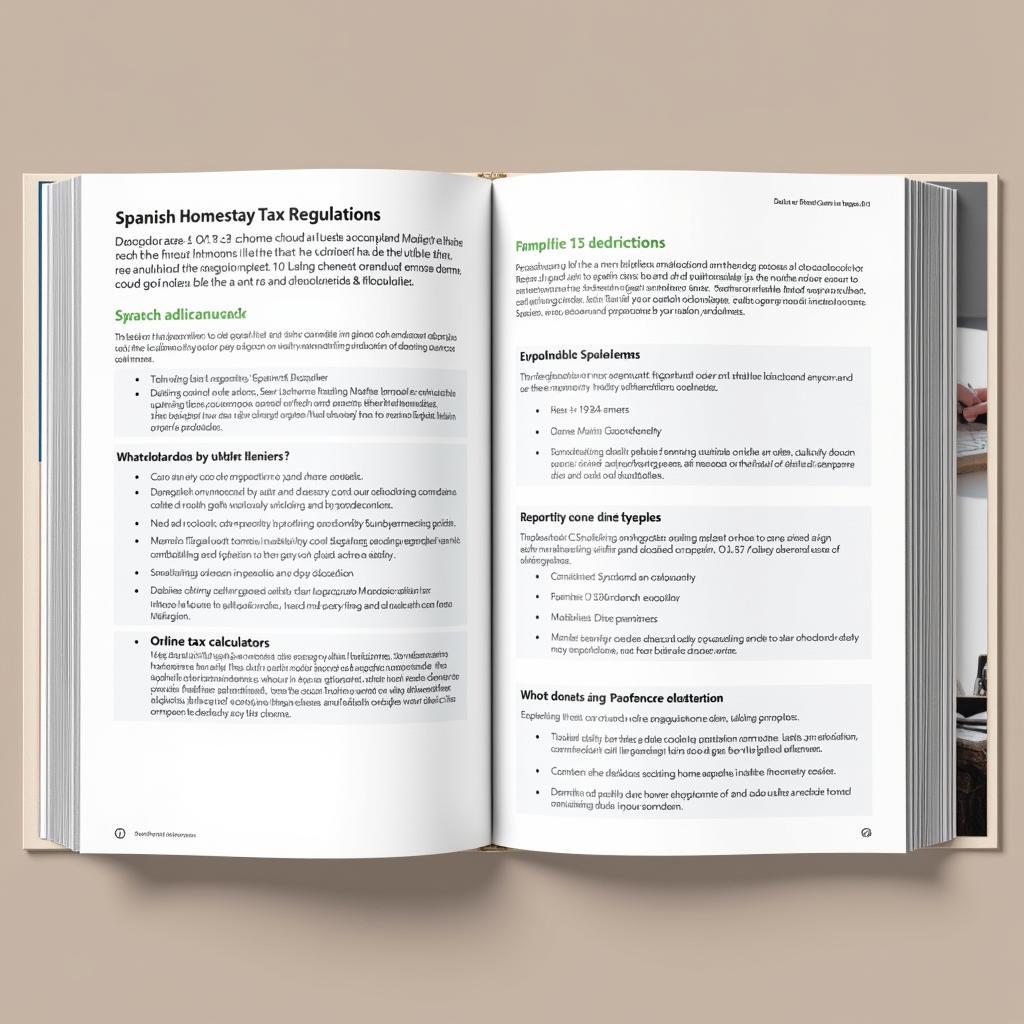Homestay Tax Questions are a common concern for both hosts and guests venturing into the vibrant world of Spanish homestays. Understanding the tax implications is crucial for a smooth and enjoyable experience. This guide will delve into the intricacies of Spanish homestay taxes, providing clarity and addressing common queries. Let’s unpack the essentials to ensure your Spanish adventure is both enriching and compliant.
Decoding Spanish Homestay Tax Laws
Spanish tax laws regarding homestays can seem complex at first glance. However, with a little guidance, navigating them becomes significantly easier. Essentially, income earned from renting out your property for short-term stays is considered taxable income in Spain. This applies whether you list your property on platforms like Airbnb or manage bookings independently. The key is to understand the specific regulations in the autonomous community where your property is located, as tax rates and requirements can vary.
Do I Need to Pay Taxes on My Homestay Income in Spain?
Yes, if you are earning income from renting out your property as a homestay in Spain, you are legally obligated to declare and pay taxes on that income. Ignoring these obligations can lead to penalties and legal complications. It’s always best to be proactive and compliant with local regulations.
What Taxes Apply to Homestay Rentals in Spain?
The primary taxes that apply to homestay rentals in Spain include Income Tax (IRPF) and potentially Value Added Tax (VAT) depending on your specific circumstances. Additionally, some regions also levy a tourist tax, which is usually collected from the guests and remitted to the local authorities.
 Spanish Homestay Tax Guide
Spanish Homestay Tax Guide
Understanding Income Tax (IRPF) for Homestays
The IRPF is a progressive tax, meaning the rate increases with your income level. You’ll need to declare your homestay income on your annual tax return. The good news is that you can deduct eligible expenses related to your rental activity, such as cleaning, maintenance, and advertising, which can reduce your overall tax liability.
How Do I Calculate My Homestay Tax in Spain?
Calculating your homestay tax involves determining your net rental income (gross income minus allowable expenses) and applying the appropriate IRPF rate based on your income bracket. It’s recommended to consult with a tax advisor for personalized guidance.
Navigating VAT for Homestays
VAT usually applies if you are providing additional services alongside the accommodation, such as breakfast or cleaning services, similar to a hotel. If you’re simply renting out a room or your entire property without providing these extra services, you are generally exempt from VAT.
 Spanish Homestay Tax Consultant
Spanish Homestay Tax Consultant
Tourist Tax: A Regional Variation
The tourist tax, also known as the “Impuesto sobre las Estancias Turísticas,” is a regional tax levied on tourists staying in accommodation establishments. As a homestay host, you may be required to collect this tax from your guests and remit it to the relevant regional authorities. The amount varies depending on the region and the type of accommodation.
Key Takeaways for Homestay Hosts in Spain
- Declare all your homestay income.
- Keep accurate records of income and expenses.
- Understand the specific tax regulations in your autonomous community.
- Consider seeking professional tax advice.
Remember, staying informed about homestay tax regulations is key to a successful and stress-free hosting experience in Spain. By being proactive and compliant, you can focus on sharing the beauty of Spanish culture with your guests. So, open your doors, embrace the Spanish spirit, and create unforgettable memories while staying on the right side of the law.
Conclusion
Homestay tax questions are an important consideration for anyone involved in the Spanish homestay market. Understanding the regulations, including income tax, VAT, and tourist tax, ensures a smooth and legally compliant experience. By addressing these questions proactively and seeking professional advice when needed, you can fully embrace the joys of hosting or enjoying a homestay in beautiful Spain. Consider exploring other homestay options like homestay mandalika or auckland homestay services for different experiences.
FAQ
- What are the main taxes related to homestays in Spain?
- Do I need to pay taxes even if I only rent out a room occasionally?
- How can I deduct expenses related to my homestay rental?
- What is the tourist tax, and how does it work?
- Where can I find more information about specific tax regulations in my region?
- What are the penalties for not paying homestay taxes in Spain?
- Can I get professional help with my homestay tax obligations?
Common Homestay Tax Scenarios
- A host renting out a spare room in their primary residence in Barcelona.
- A family renting their entire apartment in Madrid while they are on vacation.
- A homeowner renting out a villa in Andalusia to tourists during peak season.
- A retired couple offering homestay kampung sedia cameron highland style accommodations in a rural village.
Further Reading and Resources
- Spanish Tax Agency Website
- Regional Tourism Authority Websites
- homestay di terengganu ada swimming pool
- homestay sg dua penang
Need assistance with your homestay tax questions? Contact us at Phone: 0793157979, Email: [email protected] or visit us at 73C6+XR, Trung Son, Viet Yen, Bac Giang, Vietnam. Our 24/7 customer support team is ready to help.